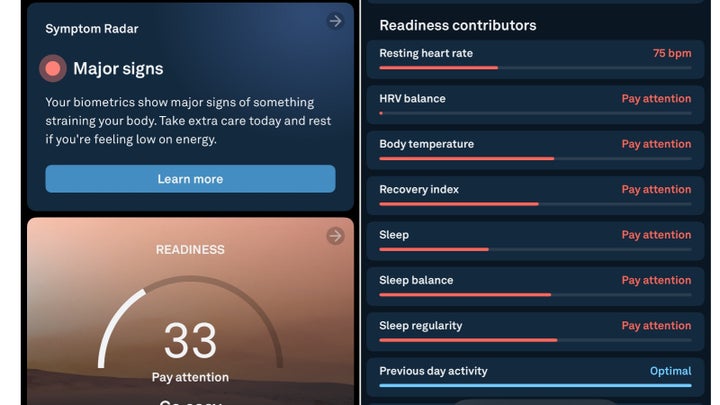Yes, The Oura Ring Has Helped Save Lives — But Experts Say To Heed This Warning
Nurse practitioner Nikki Gooding wore her Oura ring for three years without incident. But then the ring, which tracks sleep, stress and fitness using health metrics, started warning the Virginia-based resident that something in her body was wrong in the beginning of last December.
The Oura ring app, which is connected to her device, started telling Gooding that she showed “major signs” of something “straining” her body. Her resting heart rate and body temperature were elevated, and her sleep scores were poor.
Advertisement
“When I first got [the warning], I thought maybe I was just fighting some sort of viral illness. But then I kept getting it,” Gooding told HuffPost.
The continuous alerts concerned Gooding and when she discovered a lump on her neck, these warnings pushed her into making an immediate appointment with her doctor. Gooding officially got diagnosed with lymphoma and is currently undergoing chemotherapy.
The Oura ring’s warning “definitely validated the way that I was feeling and then made me take it more seriously,” Gooding said. She posted a TikTok about how her ring “knew I had cancer before I did” that has been liked over 200,000 times.
Advertisement

Courtesy of Nikki Gooding
Gooding is not alone in crediting the Oura ring for helping to detect a major illness. Following Gooding’s viral TikTok, more people in her comments shared how their wearable tech device alerted them that something was changing in their body before they fully realized it, and led people to get diagnosed for pregnancies, tumors and life-threatening heart conditions.
But Gooding said the Oura “absolutely” does not replace a doctor.
Oura specifically states on its site that its ring “is not a medical device and is not intended to diagnose, treat, cure, monitor or prevent medical conditions or illnesses.” Its temperature sensor is only 92% accurate under real-world conditions. The ring does not diagnose people with specific conditions, but it does share when biometrics are elevated, changing its data into an urgent red font.
Advertisement
And it’s these red warnings that are causing people to make major health decisions, like finally making a doctor’s appointment that they might otherwise put off.
During COVID in 2020, the NBA even gave the Oura ring to players and league staff to wear, so that teams could catch early signs of illness and prevent community spread of COVID.
In this way, the Oura smart ring and similar commercial monitoring devices have evolved from trackers that just count steps and calories to becoming people’s health coaches who push people into seeking medical attention.
Advertisement
For Natalie Esparza, her Oura ring’s symptom warnings pushed her to go to the emergency room just in time. In February, when Esparza woke up vomiting and with severe stomach pain, she initially thought she had norovirus.
But then she got the “major signs” of illness alert from her Oura, a message the app didn’t send when she actually had colds or norovirus in the past. Esparza decided to go to the emergency room, where doctors diagnosed her with appendicitis and told the California resident that if she had waited longer, it would have elevated her risk of getting sepsis.
“If it wasn’t for the ring telling me that [major signs alert], I wouldn’t have gone. I probably would have waited a little bit longer to go to the hospital,” Esparza said. “For me personally, [the ring’s alert] was that final push. Like, ‘No, you gotta go.’”
Advertisement
Esparza’s story mirrors the recent story of Paralympic track star Hunter Woodhall who also said in a TikTok story that his Oura may have “saved” his life, because its “major signs” alert pushed him to go to a doctor and get diagnosed with appendicitis.
At first, Woodhall thought his stomach cramps were due to eating cheese and having a lactose intolerance. But because it was the first time in his four years of wearing the ring that he saw that notification, Woodhall took the Oura’s warning seriously.
“I’m so stubborn that I think without what this ring was telling me … I don’t know if I would have gone to the hospital,” Woodhall said in his TikTok.
Advertisement
Oura rings can be helpful health coaches. Just know that they can be wrong, too.
When you read about the above anecdotes, it might make you think an Oura ring is an all-knowing health god. But temper your expectations.
Wearable health trackers give users an extensive report of their biometrics, but don’t mistake what it tells you for infallible knowledge. One 2024 systematic review of 28 studies of wearable health devices’ ability to detect cardiovascular conditions, COVID and physical falls, found that this technology showed the most accuracy in identifying atrial fibrillation and COVID in particular.
Exercise physiologist Andrew Jagim, who has authored research on the accuracy of fitness trackers, said wearable devices can provide valuable feedback on how your body is doing “in terms of just overall physiological health.“
Advertisement
Jagim specifically pointed out a sharp decline in heart rate variability (HRV) ― which Gooding showed in her own stats before her cancer diagnosis ― as a general indication that something is wrong, he said. Heart rate variability tracks fluctuations between heartbeats, so if you suddenly have low heart rate variability, it could be a worrisome sign that your body is becoming less resilient.
It’s a sign that “you could be sick, you could be run down, stress, [you did] not get enough sleep, or sometimes all of the above,” Jagim said.
He likens this sensitive biometrics symptom of HRV to a “‘check engine’ light where something’s wrong with your car. You just don’t exactly know what would be the issue until you get further testing done.”
Advertisement

AJ_Watt via Getty Images
So don’t panic if you get an alert from your wearable device that something is off. It might be because you had a hard workout the day before.
Jagim, who uses an Oura, said he has gotten low readiness scores from his ring after two-hour workouts. It’s a reminder that downward trends from an Oura do not necessarily indicate something is severely wrong. “It’s OK for normal fluctuations in our physiology to occur. That’s just how our body responds to stress or intense activity.”
Advertisement
For example, if you fly internationally, your HRV score might be low the next day because flying is stressful on the body, Jagim said. At the same time, he said that any alert about heart rate irregularity would be concerning enough for him to follow up with a health professional.
Overall, Jagim said that wearable technology is advancing rapidly enough that within the next five years, he expects devices to integrate their data with electronic health records, so that doctors could also get a heads up about concerning results.
Smart health monitors can be both reassuring and panic-inducing.
But these devices are not for everyone. Many people report having to take off their smart devices because the information overload causes them too much anxiety to work out or sleep in peace.
Advertisement
Even in Gooding’s own TikTok, people in her comments said that the “major signs” of illness language is too scary to receive. “I got [an Oura] to help with my health anxiety and it made it worse,” one TikToker replied to Gooding’s story. That’s a normal response, too.
Exercise scientist and sports psychology consultant Nicole Hagobian said the majority of athletes she works with actually get more anxiety from wearable devices than they do benefits, because they fixate on the data and negatively compare their stats with their peers.
“People need to consider: How do I feel when I get this information on such a regular basis? It’s constant feedback,” Hagobian said. If the answer is “highly stressed,” then these smart trackers may not be for you.
Advertisement
“For me personally, [the ring’s alert] was that final push. Like, ‘No, you gotta go.’”
– Natalie Esparza
Sometimes, too much information about yourself is not reassuring. If you already have a diagnosed health condition, this tracker might make you feel even more stressed. In one 2024 study, patients with prior diagnosis of atrial fibrillation reported higher rates of calling their doctor and symptom management when they used a device that had cardiac monitoring features.
Hagobian said it’s an example of how wearable devices can cause “hyper-seeking medical attention maybe when [people] don’t need it.“
Advertisement
As for Esparza, what some people see as anxiety-invoking, she sees as a comforting health monitor that validates her worries. Esparza said her Oura’s warnings reassure her than when she shares the app screenshots saying something is wrong, “It’s not just me being a little bit hypochondriac.”
Before her appendicitis episode, Esparza would only recommend the expensive smart ring that can retail for hundreds of dollars if “you have FSA [flexible spending account] funds and you don’t know what to do.” But now, she wants to buy Ouras for her family.
We Don’t Work For Billionaires. We Work For You.
Already contributed? Log in to hide these messages.
“I want to get it for my parents, and have access to their stats so that I could see if I need to be worried,” she said.
Advertisement

Comments are closed.